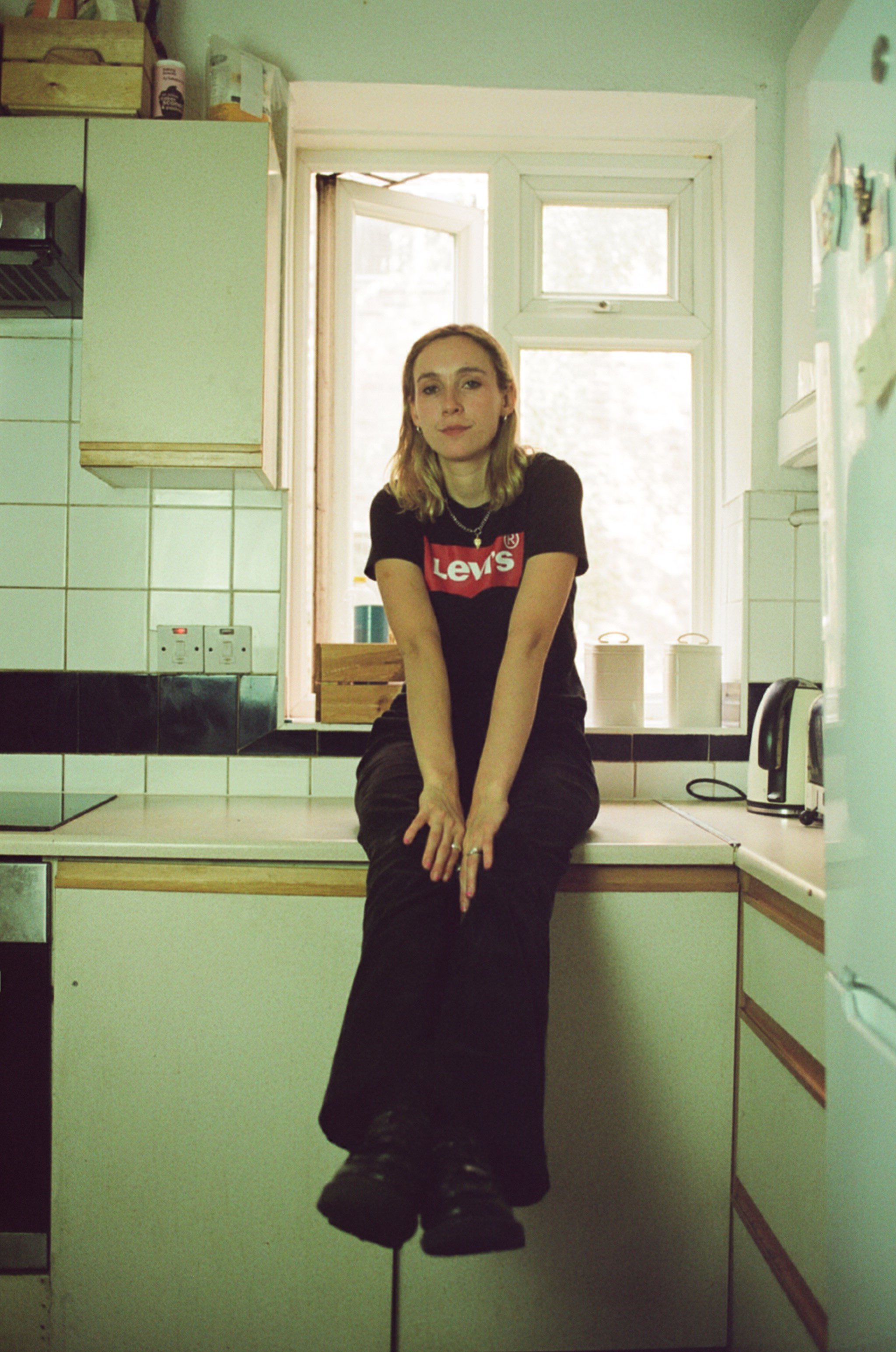ASHA LORENZ: ‘I FIND IT HARD TO LOOK TO THE FUTURE BECAUSE I GET TOO STUCK IN THE PAST’
Ahead of the release of their hotly anticipated sophomore album, our Digital Editor Daisy Carter talks to Sorry’s Asha Lorenz about growing up, opening up, and coping with change.
(All photos taken on film by Megan Graye, styled by Dani Murden & assisted by Amber Lashley)
“I think it’s good to pick your battles wisely”, smiles Sorry’s lead vocalist, guitarist and co-songwriter, Asha Lorenz, as we speak over the phone. She may be talking about how often the north London band go out after a gig, but her words convey a careful thought which extends to the rest of our conversation, too. In fact, this purposefulness is perhaps the calling card of their upcoming second album, ‘Anywhere But Here’; even more considered than the band’s debut, it sees them hone in on cohesion whilst zooming out on perspective.
The five-piece - completed by Louis O’Bryen (co-songwriter and guitarist), Lincoln Barrett (drums), Campbell Baum (multiple instruments) and Marco Pini (electronics) - are in the midst of a packed rehearsal schedule when Asha and I speak. They’re gearing up for the biggest tour of their lives, celebrating the album release with dates both here and Stateside, as well as a self-described ‘black tie’ listening party in their adopted stomping ground of Brixton. Orbiting around - but crucially not subsumed by - the much-feted Windmill scene, Sorry initially gained a reputation for discordant guitars and clever sampling, establishing themselves as musical polymaths who can incorporate trip-hop as easily as they can shoegaze.
Although obviously possessing a quiet confidence in their music, in conversation Asha is unassuming and humble - almost as if she’s slightly bemused by the press furore that’s surrounded Sorry since the release of their debut album, ‘925’. Released in March 2020, the album was one of the nation’s first lockdown releases, and it undoubtedly formed part of the soundtrack of those uncertain months. This time around though, Asha was certain that they should be deliberate in differentiating ‘Anywhere But Here’: “We wanted to have a progression from the first [album]. When I listened back to it, I felt like things stuck out quite a lot - which maybe was fine then - but I wanted this one to feel like each song [has] its own gravity, and that things weren’t falling from different places too much”. A key element of this cohesion is the comparative rawness of ‘Anywhere But Here’, which foregrounds an increased sense of dialogue between Asha and Louis (notably on ‘Tell Me’ and ‘Screaming In The Rain’), as well as what she calls “more of a live feel”.
“It is important to the sound that it’s ours”, Asha says, explaining how herself and Louis co-produce all the band’s output. “I think that the trinkets and the bits we add in the process of making the songs mean that the production is like an instrument in itself… I feel like when we give too much [of that] away, it doesn’t sound how it should”. In addition to their in-house creative direction, ‘Anywhere But Here’ was also produced by Ali Chant and Portishead’s Adrian Utley. How did Asha find the experience of opening up their music to external input? “It was definitely a learning curve for me”, she acknowledges, “just in terms of giving away some control and trusting people a bit more. It was nice to talk to [Ali and Adrian] and benefit from their suggestions. We used to be more devout to the demo, so hearing the songs in different ways was quite cool”.
Not only does the album’s live-oriented production lend itself to gig performance, but it also means that, on wax, the band have never sounded so exposed. “It’s just kind of naturally what came about”, Asha muses. “I was listening to more classic songwriters from the 70s and I wanted the songs to stand on their own, not hidden behind the production or gimmicky lyrics”, she says. “They just felt a bit more sincere - maybe that’s us getting a little bit older”.
Such vulnerability is at its most stark on the single ‘There’s So Many People That Want To Be Loved’, a poignant observation of the loneliness one can feel even at the heart of a bustling city; especially at the heart of a bustling city. “I had the main concept - I knew I wanted the song to be called that”, Asha explains, “and then the rest just kind of flowed out”. Grounded by a gentle, metronomic drum pattern, the track paints brief vignettes of anonymous characters going about their daily lives: waiting for a train, walking their dog, dancing in a club. I’m wary that if I’m in a good place… you can be up and down in no time, right?”, she tells me, explaining the concept behind the track.. “So you can kind of see yourself - well, I can see myself - in all these different people”. Ultimately, the track links those characters (and the rest of us) by vocalising their common yearning for connection that, while relatable, is often difficult to admit. “I just wanted others to be able to say ‘oh, I’m like that too’”, agrees Asha.
‘Anywhere But Here’, then, is an album which pulls back the curtain on its creators a little more; it’s the astronaut removing their helmet. And, like the band’s debut, it seems to refute genre labels, flitting easily between upbeat, more pop-oriented cuts (‘Let The Lights On’) and sauntering, jazz-influenced offerings (‘Willow Tree’). Such transformation isn’t constrained to the tracks’ arrangements, either; thematically, metamorphosis weaves throughout the album’s 42-minute runtime as Asha attempts to navigate her changing relationships with others, with London, and with herself. “Yeah, I find it hard”, she admits. “I always feel with change that I’m going to lose more - I’m so scared of what I’ve lost, instead of thinking about what I might gain. I find it hard to look to the future because I kind of get too stuck in the past”.
Since the pandemic, it’s almost as if we’re all collectively suffering from this sort of inhibitive nostalgia. For Asha, this feeling of liminality went deeper, manifesting in her subconscious as the space iconography found throughout ‘Anywhere But Here’. “I actually had a dream about the album cover”, she explains, describing a scenario in which the Earth was unable to move due to the gravitational force of two moons pulling it in different directions. Neatly representing a number of dualities, Asha decided that this astronomical concept was an apt metaphor for the band’s new material: “The album’s a lot about little deaths and rebirths [...] it goes through light and dark, up and down, and me and Louis as boy and girl - I think it’s just what made sense”, she summarises.
Expansive though these themes are, Sorry’s music is prevented from becoming too lofty through injections of sardonic humour and musical intertextuality - sonic easter eggs which reward repeated listens. ‘If you’re gonna leave / I don’t care / Go and make a lot of rich friends out there’, Asha spits on ‘Key To The City’, referencing Cat Stevens’ ‘Wild World’ while O’Bryen conducts a Bowie-esque countdown in the background. “[The lyrics] just came about like that, and then we couldn’t un-hear it and we thought it was funny”, she says of this collage-like process. “We actually emailed Cat Stevens… he said no. So we changed the lyrics even more and got away with it”, she smiles.
Picking their battles wisely indeed. Refreshingly uninterested in social media oversharing or having a particular ‘image’ (“I just don’t like wasting my time fretting over what the right thing to do is”), it seems that Asha’s driving motivation is ultimately still just making music with her mate. Despite the immense potential of ‘Anywhere But Here’ to launch Sorry further skyward, she can’t help but stay down to earth - and that’s part of the appeal.












